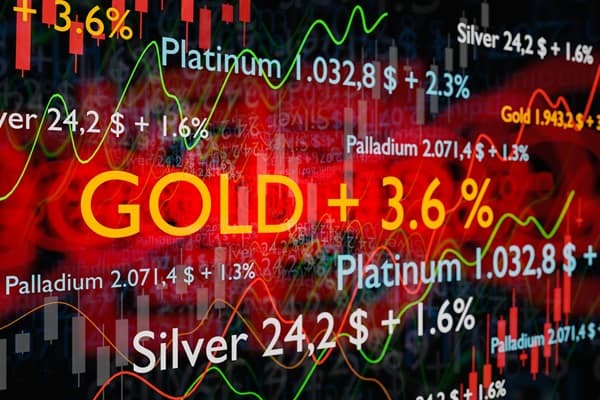Bussiness
Is gold facing a historic peak or an imminent correction? – London Business News | Londonlovesbusiness.com

Gold prices have reached a record high, trading at $2669.70 today, Wednesday, reflecting a strong performance for precious metals.
This unprecedented rise is supported by a decline in U.S. consumer confidence in September to its lowest level since August 2021, reflecting growing concerns about the labour market and economic outlook.
As uncertainty increases, gold has become a more appealing haven, raising questions about the sustainability of this rise and whether we are on the brink of a correction.
I believe that market data shows that the drop in consumer confidence is a direct result of the current economic challenges, including concerns about inflation and recession.
From my perspective, the decline in consumer confidence reflects individuals’ worries about the overall economic situation, which enhances the appeal of gold as a safe investment choice. Here, an important question arises: Will gold prices continue to rise amid these difficult economic conditions?
The rise in gold prices coincides with a decrease in U.S. Treasury yields to 3.73% and a weakening of the U.S. dollar, which has fallen by 0.42% against major currencies. In my view, this drop in yields enhances gold’s attractiveness, as holding it becomes less costly compared to investing in bonds. Under these conditions, it is worth noting that gold prices may continue to rise; however, long-term expectations require caution.
Additionally, geopolitical tensions in the Middle East contribute to the strength of gold prices. The greater the international instability, the more appealing safe assets like gold become. I expect these tensions to continue supporting prices shortly. Here, we can ask: Will geopolitical developments lead to price stability, or will they drive a correction?
I also believe that market expectations for a Federal Reserve rate cut in November will influence gold’s movement. Lowering interest rates reduces the opportunity cost of holding gold, thereby boosting demand for it. It is noteworthy that the rising demand for exchange-traded gold funds and the resilience of the services sector in the U.S. economy may contribute to price enhancement. However, the question remains: Will a rate cut be sufficient to support gold prices amid economic changes?
To answer the previous questions, I believe reports indicate that gold prices continue to rise from a record high to an all-time high. The latest level reached $2670 per ounce, which is $140 higher than the previous record set just five weeks ago. Therefore, I believe this rise reflects gold’s benefit from its role as a store of value during times of inflation and uncertainty.
This rise can continue, as my price forecast reaches $2740 by the end of the year. On the other hand, the impact of Chinese monetary policies on gold prices cannot be ignored. The People’s Bank of China has cut the lending rate, which may support the deteriorating economy and lead to increased demand for gold.
Looking at the economic data, the U.S. consumer confidence index shows a significant decline, reflecting general anxiety about the economic situation. This drop in confidence may heighten investors’ caution, potentially leading to volatility in gold prices. Markets also expect the Federal Reserve to cut interest rates, which may further pressure the dollar, benefiting gold’s continued rise.
From my perspective, while gold performs strongly under the current circumstances, economic and political challenges remain. Despite supportive factors, some risks must be monitored. Investors should be cautious and stay updated on market developments, as a correction could be imminent at any time and could reach significant psychological levels at $2600 and $2500 in the near term.









